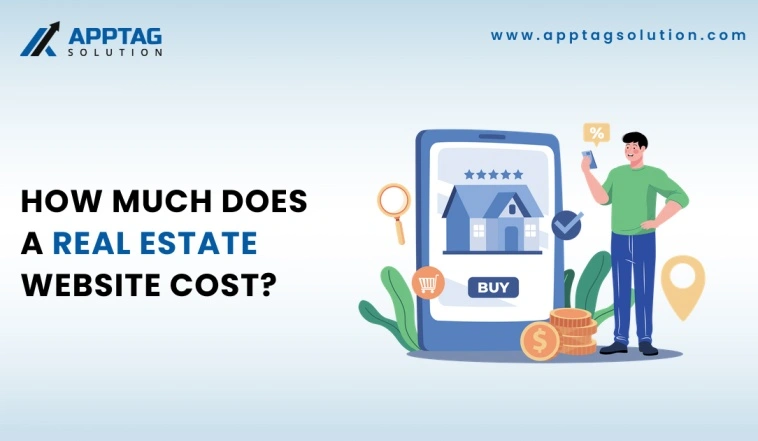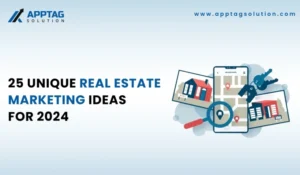Real estate websites are essential, mainly as businesses rely increasingly on digital platforms. They serve as virtual stores, showcasing properties and offering details to potential clients. However, depending on several aspects, the costs of making one can change significantly.
Real estate market overview
A thorough understanding of the real estate industry is crucial before delving into the expenses of creating a real estate website. This industry faces intense competition in a rapidly changing environment of rapidly evolving trends and expectations. Maintaining a professional online presence is imperative and a source of inspiration for staying ahead of the curve. It enables them to keep a head start on their competitors.
The most recent figures show that over 90% of individuals searching for a home now utilize search engines as their primary information source. This reiterates the significance of having a well-designed and easy-to-use real estate website, instilling confidence in your digital strategies.
Significant Costs Associated with Web Development
The following list outlines the primary cost factors for creating a new website and how they affect its pricing. The money you will need for a new real estate website will depend on how many hours you need to complete each process listed below. In addition to this cost, you will still need to buy a domain name.
- Content Formation
There is a vast array of information available for your website, and it will be required to have it to fill its pages. Examples of what could be included here are branding assets, high-quality photos, renderings, written content, and building details (floor plans, site plans, stacking charts, etc.). Consider outsourcing to experts to help you prepare your initial content for your new website while you are constructing it if you need more time or resources to handle it all yourself.
If you have a section that needs to be updated frequently (such as a blog, news section, study, etc.), consider signing up for a continuous agreement to help fulfil your content-generating needs.
- Website design
A lot of work is dedicated to the design stage when building a website. It affects how your website looks overall and how users interact on all platforms (desktop, mobile, and tablet). It is made up of multiple crucial parts. Generally speaking, this comprises:
- Visual design
- Content organization on every page
- Choice of colour schemes
- Choosing the appropriate font
- Visual elements (buttons, icons, and so on)
The amount of time (and associated costs) allocated for design during this phase will depend on the overall number of pages, the visual elements, and the intricacy of the custom graphics.
- Project Management
A project manager is typically in charge of overseeing a website project. This person manages the project’s whole lifecycle, from conception to completion. Their responsibilities include finalizing all client requirements, gathering all creative assets (logos, photos, fonts, etc.), creating timelines, managing production schedules, helping to define the website’s structure, coordinating with designers and developers, guaranteeing the quality of deliverables, and following up with clients to make sure any expectations or questions are met.
- Property search filters
Pages that provide specifics on the property
- Clickable maps
- Interactive site plans
- Interactive stacked chart charts
- Investor and customer portals
- Weblogs
- Utilizing tools from outside sources
- Website Development
During the development stage, the designs are developed into a clickable website prototype. The website will be fully interactive and functional on desktop computers and all major browsers.
The time required to complete a project depends on several factors, including the website’s size, the inclusion of interactive elements, and the presence of complex technology. Here are a few instances of them:
- Ongoing upkeep and hosting services
Following the publication of a website, ongoing services are usually required. These services are intended to ensure that you get the most out of your website and that it works without any issues. Continuing services probably consist of:
- Web hosting
- Numerous security upgrades and patches
- Updates for the plugins and CMS
- Support for technological issues
- Data backup

See How My Agency Can Grow Your Real Estate Business
- Web Design – Expert web design that elevates your online presence.
- Web Development – Custom web solutions that power seamless user experiences.
- SEO – unlock more SEO traffic. See real results.
Real estate website platform expenditure:
Depending on the size and complexity of the website, the anticipated expenses for real estate websites might vary considerably. The breakdown of the estimated costs is as follows:
- Small Real Estate Website (one to ten Pages): For those who are just starting out in real estate investing, creating and managing a tiny website with basic features could cost anywhere from one thousand to five thousand dollars. These features include the capacity to search, provide property listings, and incorporate SEO optimization.
- Medium-Sized Real Estate Website (10–50 Pages): Medium-sized real estate websites with features like MLS integration, lead generation forms, and mobile responsiveness can cost between $5,000 and $15,000.
- Big Real Estate Website (50 Pages or More): This is a large real estate website with all the bells and whistles, including custom design elements, CRM connection, and advanced search engine optimization (SEO) up to $15,000.
The expected costs should be carefully considered; the actual costs may differ based on several variables, such as the level of customization features chosen and the rental model.
The design, the integration of functions, and the staffing models are some variables that affect estimates of the expenses related to real estate websites. If these elements are carefully thought out and included in the budgeting process, estimating the cost of such an undertaking will be feasible. For the best evaluation you need to look for a reputed Real Estate Web Design Company to help yourself and for the right quotation.
Web development expenditure is intact with real estate
Since a website’s usability and aesthetic appeal are crucial, designing and building one is inextricably linked to the total website cost in the real estate industry. The cost of developing a website is contingent upon several factors, including the website’s functionality, complexity, and necessary customizations. Potential tenants or customers are drawn to and engaged by an attractive and easy-to-use website.
- Features for Searching and Listings of Availability
Real estate websites should have powerful tools for listing properties and effective search capabilities. These qualities ought to satisfy the demands of complexity and customization. The implementation expenses ought to fluctuate based on the intricacy and customized needs. Additional costs may be incurred for integration with databases from Multiple Listing Services.
- Ability to Adjust for Mobile Devices
It is becoming increasingly crucial to have a flexible website design that can fit a range of devices and screen sizes because the use of mobile devices is growing exponentially. Depending on the intricacy of the sites themselves, device optimization needs, and the screen sizes users want, expenses will likely be associated with creating such websites.
- Customer relationship management system integration
Real estate businesses find handling leads, monitoring client interactions, and optimizing procedures simpler when CRM (Client Relationship Management) tools are integrated into their operations. This is because the price of a CRM connection varies based on the CRM system being used and the degree of customization that is necessary.
- SEO
With the aid of SEO services, you may raise the visibility of your real estate website on search engine result pages, increasing the number of visitors who come from organic search results. Several elements influence their costs, including link building, content optimization, and keyword research optimization requirements.
Registration fees vary depending on the type of extension and the registrar’s choice. They also change based on server resources, bandwidth and security precautions. Websites selling real estate need reliable hosting companies and domain registration fees.
- Updating and Assistance
If you want your real estate website to work flawlessly, you must provide ongoing maintenance and care. The cost of this kind of support might vary based on several factors, such as the level of knowledge needed, the upgrades required to apply security patches or address issues, and the quality of the help needed.

See How My Agency Can Grow Your Real Estate Business
- Web Design – Expert web design that elevates your online presence.
- Web Development – Custom web solutions that power seamless user experiences.
- SEO – unlock more SEO traffic. See real results.
Final Thoughts
Several factors influence the total cost of real estate websites. These factors include the level of customizations necessary and the complexity of the design and functionality requirements. Real estate businesses should consider particular investment objectives while creating their website budget. Numerous advantages could result from this investment, such as better user experience, visibility, lead generation, and adequate capacity to promote assets or services. Ultimately, the costs related to a real estate website should be long-term expenditures toward sustainable and successful business operations.




